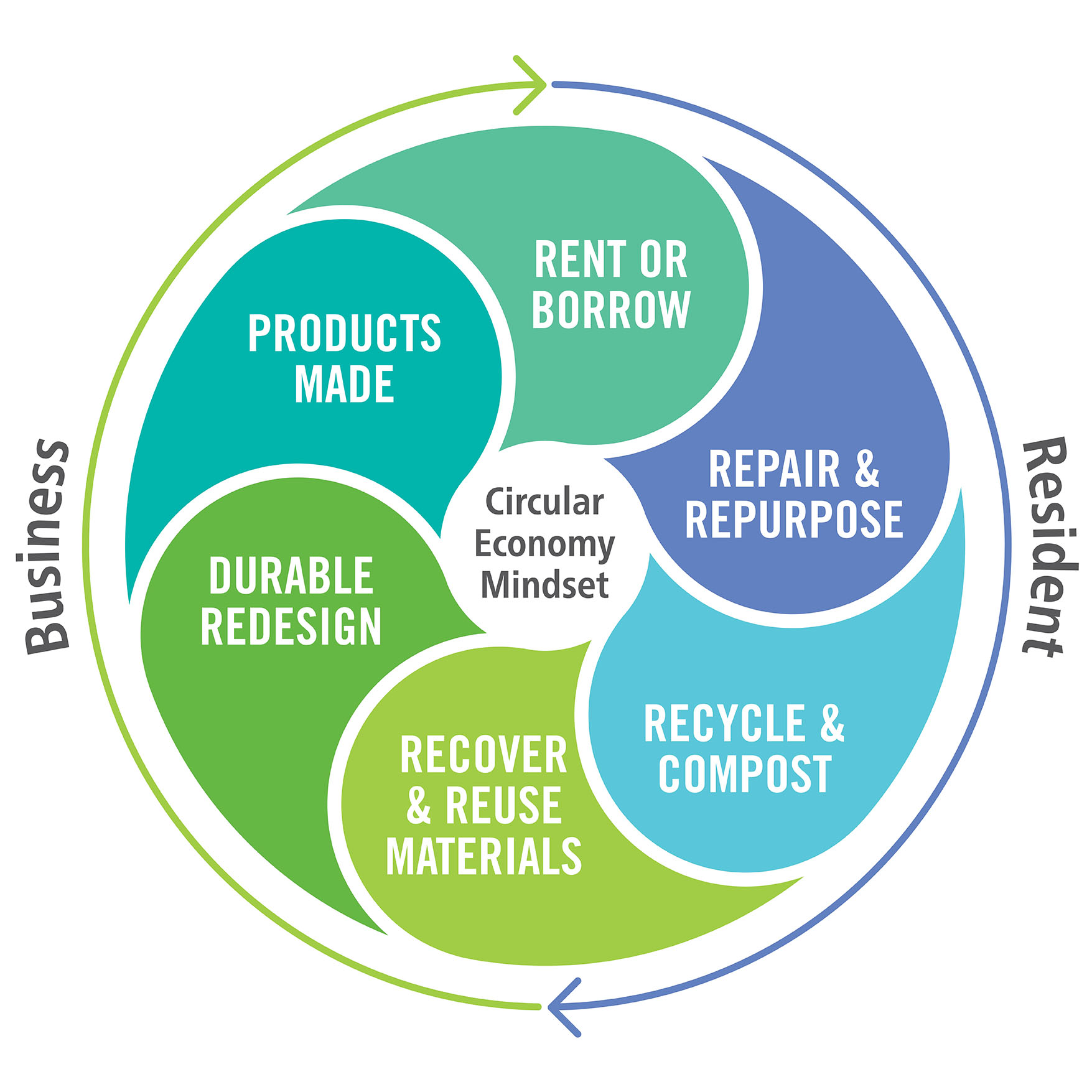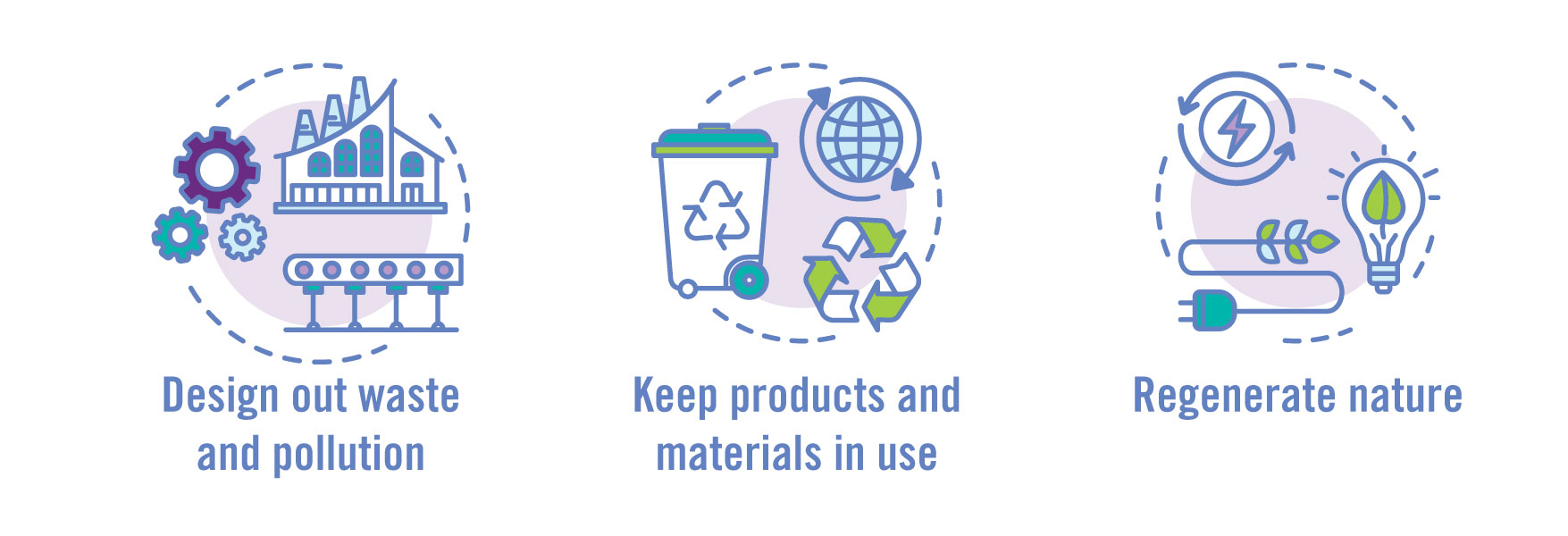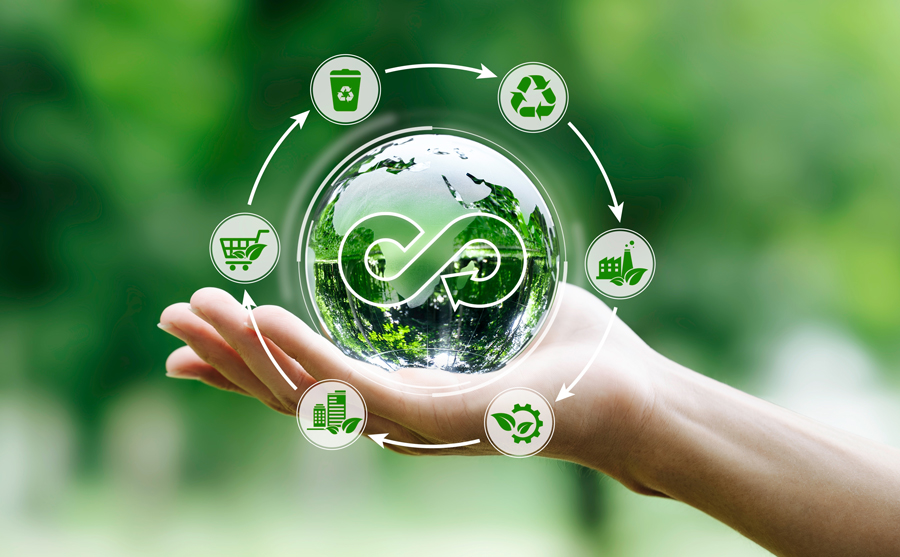Circular Economy
What is a Circular Economy?
A circular economy eliminates waste and pollution, and conserves resources. It is a shift from a throw-away to a circular mindset to extend the lifecycle of goods, food and resources through better design and continuous reuse, so nothing goes to waste.
How a Circular Economy Works

In a circular economy, instead of industries, manufacturers and consumers taking resources, using them once and disposing of them, they will be kept in use. Products will be designed to be more durable, reusable, repairable and recyclable, and businesses will look for ways to eliminate waste in their operations.
Consumers will rethink the way they purchase, use and dispose of things – options for sharing, renting, repairing and repurposing items to prevent waste will become more common. This circular shift will lead to less impact on the environment, allowing the earth’s resources to recover and regenerate.
What York Region is doing
York Region’s waste management master plan, also known as the SM4RT Living Plan, has a visionary goal of “a world in which nothing goes to waste” and includes an objective to “inspire people across the Region to embrace SM4RT Living and advance the circular economy”.
To reach these goals the Region developed several initiatives to promote SM4RT Living’s 4Rs (reduce, reuse, recycle and recover) that align with a circular approach to waste management.
The Region also developed a Circular Economy Roadmap that identifies opportunities to integrate the circular economy into its operations, programs and policies.
Community engagement

In October 2023, York Region held an open house and hosted an online survey to gather feedback about resident’s knowledge of circular economy programs and practices. Watch the recording
In July 2024, York Region hosted an online survey for businesses to learn how they participate in the circular economy, the benefits and challenges they are experiencing and what supports they need to succeed.
Information gathered will help inform implementation of the Circular Economy Roadmap as well as an update to the SM4RT Living Plan in 2025.
Results from both surveys have been combined in a “What You Said Report”
Resources for residents
Waste and pollution are global concerns that contribute to climate change. By rethinking our purchasing habits and considering the end of life of everything we use or consume, we can extend the life of our products, as we shift from a throw-away society to one that recognizes our planet’s limits.
York Region works with community and municipal partners to provide several resident-focused initiatives that support a circular economy.
- Backyard Composting — Returns nutrients to the soil
- Circular Marketplace - Circular business directory for circular products and solutions, funded by York Region
- Curbside Giveaway Days — Event days to exchange used items
- Durham York Energy Centre — Converts garbage into energy
- Good Food — Provides education to reduce household food waste
- Lendery — Locations for borrowing household items
- Reduce Single-Use Items — Provides education on reducing single-use items
- Repair Café — Events where volunteer fixers repair items
- Recycle to Ride - Donate your used bikes at Elgin Mills Community Environmental Centre or McCleary Court Community Environmental Centre! York Region is partnering with Markham Cycles to collect used bikes, teach people how to fix them and get them back on the road where they belong
- Share, Reuse, Repair Hub - Online directory for share, reuse and repair resources, funded by York Region
- Textile Recycling — Textile/clothing donation bins located at waste depots
If your business already offers circular solutions or products, consider registering your business in the circular business directory. A project funded by York Region's Circular Economy Initiatives Fund.
Resources for businesses

A circular economy requires businesses to rethink the way they operate to lower their environmental impact. Circularity in businesses has the potential to lead to greater cost savings and innovation, and new job opportunities.
A circular approach presents new possibilities for businesses to:
- Adopt a systems-based method to eliminate waste
- Better compete and operate in a world with limited resources
- Create new revenue streams and long-term value
- Create sustainable innovation
- Increase efficiencies
- Reduce costs and environmental impact
Circular Business Models
Circular business models are designed to keep products, materials and resources in use for as long as possible. Unlike the traditional linear economy which follows a 'take, make, dispose' pattern, circular models aim to minimize waste and make the most of existing resources. A circular business considers its value to customers and stakeholders as well as its impact on the environment, from pre-production to post-consumption.
Businesses that support a circular economy follow its three key principles:

Types of Circular Business Models
- Product-as-a-Service: Instead of selling products, companies offer them as services. For example, instead of selling a washing machine, a business rents it out, taking responsibility for maintenance and eventual recycling
- Reuse and Share: This model encourages sharing, leasing and reusing products to extend their lifecycle. Businesses can create platforms for sharing tools, equipment, or even office spaces, reducing the need for new resources
- Resource Recovery: Companies recover valuable materials from old or discarded products. This includes recycling, composting and upcycling, turning waste into new raw materials or products
- Product Life Extension: Businesses focus on repairing, refurbishing and remanufacturing products to extend their usability. This model reduces the need for new materials and lowers waste
- Circular Product Design: Businesses design products with their entire lifecycle in mind, ensuring they can be easily recycled, reused or disassembled for parts. This approach minimizes waste and maximizes resource efficiency

How Businesses Can Become More Circular
Becoming more circular involves rethinking how your business designs products and manages its daily operations. Start by assessing your current processes and identifying areas where waste can be reduced. For example, consider using recyclable or biodegradable materials in your products and design them for easy disassembly and recycling.
Some other steps you can take:
- Engage with your customers to promote product returns for recycling or refurbishment
- Establish take-back programs to ensure products are properly recycled or reused, reducing landfill waste
- Consider partnering with other businesses to share resources and expertise, creating a network of circular businesses
Available resources:
- Case studies and examples of circular economy in action from Ellen Macarthur Foundation
- Circular Economy Business Toolkit from National Zero Waste Council
- York Region’s Single-use Resources for Businesses
Benefits of Adopting Circular Practices
Adopting circular practices offers numerous benefits for businesses. By reducing waste and improving resource efficiency, companies can:
- Appeal to eco-conscious consumers
- Enhance brand reputation and customer loyalty
- Help comply with environmental regulations
- Lower production costs and increase profitability
Embracing circularity drives innovation and opens up new market opportunities. By rethinking product design and exploring new business models, companies can stay ahead of industry trends and lead the way in sustainable development. In the long run, these efforts contribute to a healthier planet and a more resilient economy.
Networks and Supports
- Circular Economy Leadership Canada – A capacity-building network that provides technical expertise and collaborative platforms to accelerate the circular economy in Canada
- Circular Innovation Council (CIC) seeks to advance circular business models, products and services. CIC's Share, Reuse, Repair Hub is an online resource where businesses can list their share, reuse and repair services or find other local providers. Join the Hub to connect with customers and partners and promote sustainability in your community
- Government of Canada - Circular funding opportunities
- Impact Zero is a GTA-based non-profit offering programming for circular economy and climate start-ups, including the Circular Marketplace.
- Partners in Project Green - Looking to turn your waste into a resource or find valuable materials from other businesses? The Material Exchange Program connects businesses and non-profit groups to share materials, reducing landfill waste and fostering a circular economy
Circular Economy Working Group
The Circular Economy Working Group includes volunteer members from local businesses, community groups, and academia who have circular economy knowledge and experience.
Circular Economy Working Group (CEWG) members for 2022 to 2024 are:
- Anil Abrol, President & CEO, Eco Guardian Inc.
- Audrey Bayens, Marketing Manager, WeRCircular and Program Coordinator, Windfall Ecology Centre
- Cesar Caneo, Executive Director, SERA Community Ventures Ltd.
- Chaya Chengappa, Program Manager, Water Stewardship, Partners in Project Green
- Tom Manimanakis, Independent Consultant
- Ramu Narayanan, Writer, Blue Dot York Region
- Andrew Paton, Research Manager, Seneca College
- Morgan Sage, Food Policy Coordinator, York Region Food Network
- Taylor Stanley, Sustainability Specialist, Riverside Natural Foods
CEWG members:
- Meet bi-monthly over a two-year term
- Network, learn and collaborate with each other and Regional staff, to advance the circular economy within their own organizations and communities in York Region
- Provide expert advice and feedback to York Region’s circular economy programs, policies and plans
For details on the role and expectations of members, see the Terms of Reference.
Circular Economy - Add a Resource and Keep in Touch
Is there a resource you would like to see added here? Would you like to be kept informed of other circular economy initiatives? Please provide additional information.
Related Resources
- Circular Economy Initiatives Fund
- The Lendery
- Share, Reuse, Repair Hub
- Circular Marketplace
- Circular Business Directory Registration
- What You Said Report - Circular Economy Engagement
Circular Economy Research
- A Feasibility Study of Textile Recycling in Canada (Canada)
- Circular Economy & the Built Environment Sector in Canada (Canada)
- Circular Economy and Waste in the Fashion Industry (EU)
- Council of Canadian Academies report on the Circular Economy in Canada (Canada)
- Fighting Food Waste Using the Circular Economy (Australia)
- Preliminary Resource Recovery Report Card and Gaps Assessment for Canada (Canada)
- The Circularity Gap Report 2020 (International)
- Waste Prevention: The Environmental and Economic Benefits for Canada (Canada)


